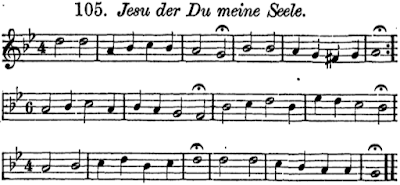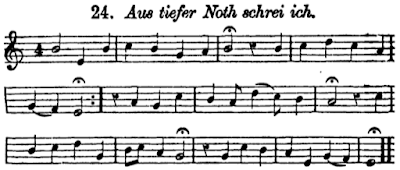Here is my translation of the Christian Life / Chastity hymn “Heilger Vater, du begehrest” or “Heilger Gott, der du begehrest” (Jacob Fabricius, d. 1654, or F. Fabricius, d. 1703), which appears revised, evidently, under the first form of the name, in Ev.-Luth. Gsb #520. Besides a heavily reworked text which, while preserving the essential ideas and many of the rhymes, reduces both poetic infelicities and “negative” language (thus we are dealing with a Rationalistic revision) and also omits stanza 9. In the earlier form of the text it is found in the Leipzig Gsb 1740 without author. Sarnighausen notes many variant lines (I include the earlier readings in square brackets) and ascribes it tentatively to F. Fabricius. His text comes from the Niedersächscisches Liederkern and Hildesheim 1719. Early titles include: “For chastity in the midst of lewdness.” The melody appointed in the Wisc. hymnal is “Jesu, deine tiefen Wunden,” while the earlier form is generally meant for “Freu dich sehr, o meine Seele.”

HOLY God, who willest clearly
That we should be pure and chaste
And forbiddest most severely
Unclean thoughts and lust debased;
I would pray through Jesus Christ,
Yea, my Bridegroom dearly prized,
Who before the world’s foundation
Hath espoused me, His creation:
2 Grant me to live chastely ever
Inwardly and outwardly,
Mind and body blemished never.
By Thy grace, oh, strengthen me,
That my flesh and spirit may
keep unstained and put away
Wicked thoughts within me welling,
Nor may grant them any dwelling!
3 Let Thy fear o’ercome my crudeness,
Leave the old man cold and dead,
That no fires of wretched lewdness
Make me anguished dread.
Heav’nly love let govern me,
Turn my soul above to Thee,
From the earthly things arising,
Worldly things and ways despising.
4 Let Thy mercy’s rivers, flowing,
Stream upon me from Thy height,
To my heart’s foundation going,
And thereby extinguish quite
All the flames of vile desire,
In my heart, as darts of fire
Turn to smoke, their flame expungèd,
When in cooling water plungèd.
5 Lo, my soul hath been created
In Thine image, dear to Thee,
Since for it Thy Son elated
Willed the sacrifice to be.
Ill would I, O Maker, yea
And Redeemer, Thee repay
If I made my soul disgracèd,
And this image thus effacèd.
6 Jesus dwells by faith unshaken
In the heart; His Spirit pure
Lets no heart from Him be taken,
Holds them as His temple sure.
May His pow’r my weakness brace,
And fulfill His work of grace,
That my heart, controlled and steady,
May stand at His service ready.
7 Eyes cannot, O God, explore Thee,
For Thou art unmingled Light,
Man can never stand before Thee
With a spot, however slight.
If Thy glorious majesty
Shall to me a blessing be,
Lord, then I must hate the baseness
Of whatever spoils chasteness.
8 If the Holy Spirit grieveth
At a single shameful word,
How much more when He perceiveth
Lewdness wholly undeterred?
Grief and care are lusting’s lot;
Shame and scandal when ’tis wrought.
When it cometh to the ending,
Then remorse shall be impending.
9 Lo, its smoke doth rise to heaven,
Yea, its reek descends to hell!
Why should any place be given
Where tumultuous lust may dwell?
Should this evil guest not be
Justly horrible to me?
Should my heart to that be idle,
Which I justly ought to bridle?
10 God of armies unresisted,
Give to me Thy Spirit’s might!
Let me be by Thee assisted,
And the foe be routed quite,
Who by stalking every day,
Causes trouble and dismay;
Chase him with the might of heaven,
Let him from my heart be driven.
11 Grant that while I still endeavor
To avoid unchastity
Outwardly, so I may never
Suffer fires to burn in me.
For Thou call’st us to be clean
Not alone in what is seen,
But to strive, by grace allotted,
To keep soul and mind unspotted.
12 Crucify my flesh’s yearning,
Choke the smold’ring coal within,
Jesus, who didst bear the burning
Of damnation for my sin,
Su’ffring cross and hellish pain,
That I might an egress gain
From the flames of wicked passion,
That I reap not condemnation.
Translation © 2023 Matthew Carver.
GERMAN
Heilger Vater! du begehrest [Heilger Gott, der…]
Keuschheit, Zucht und Heiligkeit; [daß man keusch und züchtig sei,]
du verbietest und verwehrest [und dagegen hart…]
Unzucht und Unreinigkeit. […Unfläterei:]
Ach, ich fleh durch Jesum Christ, [ich bitt dich…]
der mein Seelenbräutigam ist,
der mich von der Welt erwählet, […ihm zur Braut erw.]
sich in Treu mit mir vermählet: [und sich mir in Lieb verm.]
2 Gieb, daß ich an Seel und Leibe, [stets keusch verbleibe,]
innerlich und äußerlich,
heilig, keusch und rein verbleibe. [an der Seel und an dem Leibe]
Deine Gnade stärke mich,
das so Leib als Seele rein, [daß mein Geist und Fleisch ganz…]
und befreit von Wollust sein: […hergehen feind mag s.]
ja, laß Herr! mich Alles fliehen, [allen sündlich bösen Lüsten,]
was mich kann zur Wollust ziehen. [die sonst in dem Herzen nisten].
3 Tilg in mir unkeusche Triebe, [Deine Furcht wirk in dem Herzen]
tödte das verderbte Fleisch; [meines alten Menschen Tod,]
gieb mir deine Furcht und Liebe, [daß der schnöden Geilheitskerzen]
dadurch mach mich rein und keusch. [mir nicht machen Angst und Noth]
Unterbrich der Lüste Lauf, [Deine Himmelsliebe führ]
zieh mein Herz zu dir hinauf, [meine Seel hinauf zu dir,]
das es nicht am Eitlen klebe, [daß sie nicht am Irdschen…]
sich der Wollust nicht ergebe. [noch dem Weltstandt sich…]
4 Gott der Gnaden, ach! ergieße [Laß sich über mich ergießen
deinen Gnadenstrom auf mich, [deiner Güte Strömelein,]
daß er in meine Herze fließe: […sie in mein H. fließen,]
dadurch lösche gnädiglich [und dadurch gelöschet sein]
jeden Funken böser Lust, [alle Flammen…]
daß er niemals meine Brust [(so viel ihr in Herz und Brust)]
zu der dir verhäßten Sünde [wie ein Feuerpfeil verrauchet,]
der Unreinigkeit entzünde. [wenn man ihn ins Wasser tauchet.]
5 Meine Seel ist deinem Bilde
gleich gemacht, und doch geschätzt: […theur geschätzt,]
dein Sohn hat sein Blut so milde [weil dein Sohn sein…]
für sie sterbend zugesetzt. [selbst dafür hat…]
Drum, mein Vater! thät ich ja […thät ich dir, Schöpfer, ja]
dir und Christo viel zu nah, [und Erlöser…]
wenn ich unkeusch leben wollte, […sollt in Unglücksfällen]
und dein Bild so schänden sollte. [dies mein Seelenbild verstellen.]
6 Christus wohnet durch den Glauben […selbst wohnt durch…]
selbst in mir; sein heilger Geist [in dem Herzen, auch sein…]
lässet sich mein Herz nicht rauben, [läßt die Herzen ihm…]
das er seinen Tempel heißt. [weil es ja sein…]
Darum steht er mir auch bei, [drum geb er auch Kraft und Stärk,]
daß sein Tempel heilig sei, [und erfüll sein Gnadenwerk,]
daß ich ihm an Seel und Leibe […in Zucht an Seel und Geiste]
keusch und rein geheiligt bleibe. [ich ihm stets Gehorsam leiste.]
7 wer unrein, kann Gott nicht sehen, [Niemand kann, o Gott! dich…]
denn Gott ist das reinste Licht. [der du bist…]
Der kann nicht vor ihm bestehen, [niemand kann vor dir…]
dem die Reinigkeit gebricht. [wo ihm…]
Soll mich nun der helle Schein [Soll mir…]
deines Angesichts erfreun; […Ansehns selig sein,]
Herr! so rein'ge Geist und Glieder, [so muß mir das sein zuwider,]
mach mir böse Lust zuwider. [was die Keuschheit schlägt darnieder.]
8 Gottes Geist wird schon betrübet [Wird der heilge Geist…]
durch ein einzig schandbar Wort; [einig]
und wer sich in Lüsten übet, [wie vielmehr, wenn man verübet]
treibt ihn völlig von sich fort. [böse Lust an allem Ort?]
Wollust machet Sorg und Gram, [Geilheitslust macht…]
bringet uns in Schand und Scham. [ihr Vollbringen…]
Die in solchen Sünden sterben, [wenns denn will zu Ende laufen,]
kömmen nie dein Reich ererben. [findet sich die Reu mit Haufen.]
*9 Ihre Brunst reicht bis zum Himmel,
ihr Gestank senkt sich zur Höll,
warum sollt ich dem Getümmel
bei mir gönnen Raum und Stell?
Sollte dieser böse Gast
mir nicht billig sein verhaßt,
sollt ich dem mein Herz einräumen,
den ich billig sollte zäumen?
10 Darum, Herr der reinen Schaaren! [Starker Gott der Himmelssch.]
laß mir deines Geistes Kraft, [gib mir…]
und die Gnade widerfahren, [laß mir Hülfe…]
die ein reines Herze schafft. [daß der Feind werd ausgesch.]
Mache mir, o Herzensgast! [der mir täglich stellet nach,]
die Unreinigkeit verhaßt. [und macht so viel Ungemach,]
Auch entziehe nich der Zeiten [daß ich in die Flucht ihn schlage,]
sündlichen Gelegenheiten. [und aus meinem Herzen jage.]
11 Laß mich alle Unzucht meiden, [Gieb, daß ich nicht nur vermeide]
alle Sündenwerke fliehn, [äusserliche Hurerei,]
keine Brunst im Herzen leiden, [sondern daß ich auch nicht leide]
mich ganz rein zu sein bemühn. [innerliche Brunst dabei:]
Denn du willst ja nicht allein, [willt]
daß nur Leib und Glieder rein; [daß der L. sich halte r.]
sondern daß auch Geist und Seele […die Seel auch strebe,]
Christi keusches Vorbild wähle. [daß sie unbeflecket lebe.]
12 Kreuzge meines Fleisches Lüste,
und was sonst mein Herz befleckt, [dämpfe geile Brunst in mir,]
als wofür du, Jesu Christe! [liebster Heiland,…]
Tod und Höllenqual geschmeckt. [der du selber hast an dir]
Treib, was unkeusch, ganz von mir, [Kreuz und alle Qual gespürt,]
daß ich Leib und Seele dir [nur daß ich werd abgeführt]
als dein Heiligthum bewahre [von der Lüste geiler Flammen,]
und zu dir in Frieden fahre. [daß sie mich nicht gar verdammen.]




















